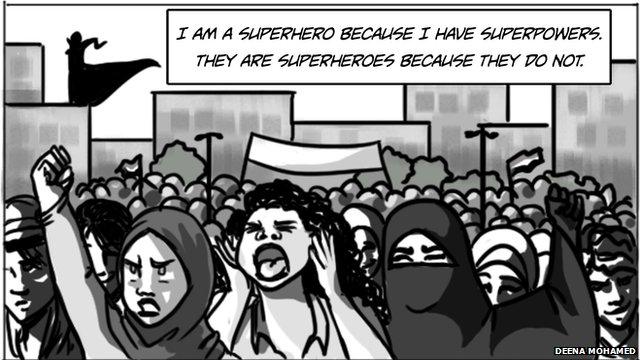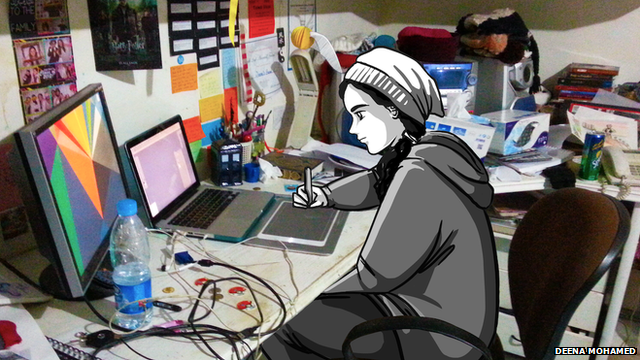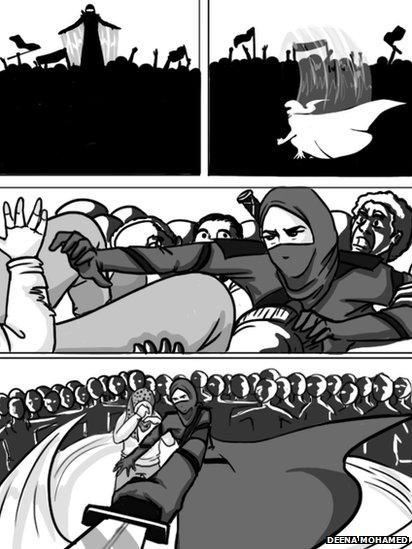Egypt's new hijab-clad superheroine
- Published

She's got comic strip superpowers, fights for justice and gives bad guys a hard time. If this makes you think of Catwoman, then think again - for this is a new kind of superheroine with a visible difference.
Meet Qahera - the hijab-wearing Egyptian comic-book character fighting back against crime and prejudice.
She is the brainchild of a young Egyptian artist who created the first ever Egyptian superhero in a web comic, external, and its picking up a growing fanbase.
"It all started as a joke with a group of friends," Deena Mohamed says.
"It was my way to respond in my own way to things that were frustrating me at the time," she laughs, "and when the idea of having superpowers was fascinating!"
But when Deena put the comic online a few months ago, she did not expect the scale of positive reactions.
Her website got hundreds of thousands of hits - more than 500,000 since September alone. Egypt is the top country of visitors to the site, followed by the US.
Deena also found enthusiasm among local publishers who asked her to create a printed version as well.
"It is insane. Way more exposure than I ever expected," the 19-year-old art student says.
Inevitably perhaps, the creation drew some negative reactions, mainly from people not convinced about adopting the Western concept of a superhero.
Deena, though, does not agree.
"We are all exposed to the idea of comics and superheroes. We are exposed to Western media so often. So I guess I was just responding to that in my own way."
Hijabi and strong
The name Qahera is the Arabic word for Egypt's capital, Cairo. It also means the conqueror or the vanquisher.

Deena says Qahera is aimed at shattering the stereotype that women who wear the hijab cannot be strong
Deena says she had her superheroine with the all-powerful name wear a hijab to combat a widespread stereotype that women wearing the Islamic attire cannot be strong.
"There is already so little representation of women who wear the hijab, although that is the majority of women I see around me, and it did not make sense not to make her wear hijab," says Deena, who does not wear a hijab herself.
Hijab - the principle of modesty in Islam that includes manners of dress - is a religious obligation stipulated by the Koran, according to scholars at Al-Azhar, the highest seating of Sunni Islam.
Deena says she had her eye on a Western audience from the beginning, another reason why her character wears a hijab, and episodes are written in English.
"I wanted to send a message about the general Islamophobic backlash, and if I was going to address that, I needed to make a statement.
"Women who wear hijab usually bear the brunt of Islamophobia," she says.
One of her comics is tackling the Western misconceptions on submissive Muslim women.
"Look, it is a Muslim woman," says one of the characters in a story featuring Western feminists.
"Sister, take off your oppression!"
But the superheroine reacts angrily to their call.
"You have constantly undermined women. You seem unable to understand we do not need your help!"
Street harassment
In the past few years, sexual harassment of women on the streets of Egypt has become a growing phenomenon.
While most women are usually helpless in this situation, Qahera does something about it.

The comic strip tackles the phenomenon of street attacks on women
Deena created an entire episode about harassment, where Qahera dons her long black hijab and carries a sword as she chases down male abusers, and flies to fight wherever a woman is mistreated.
"Never bother another woman again!" Qahera warns a beaten-up culprit.
The past few decades saw a majority of Muslim women in Egypt adopt the attire. On the streets of Cairo, there are few women with their hair uncovered.
But the modest Islamic attire fails to protect women from being abused.
The United Nations Entity for Gender Equality and the Empowerment of Women said in a recent report that 99.3% of Egyptian women, external have experienced some form of sexual harassment, whether physical or verbal.
Deena says the theme is based on real experiences with street harassment. However she does not encourage women to react the way Qahera does.
"If you are not alone and have enough support around you, you can call them out. But otherwise, you can just ignore it. It is really a difficult situation, and some women have to deal with it almost every day."
'Tribute to women'
Deena's latest episode focuses on another issue that has been taking over the streets since the 2011 uprising - protests.
But she says it is less of a superhero comic and more of a tribute - to women who contributed to the revolution in so many ways.
"I remember at one point during the revolution, people would use statistics of attacks on women to discredit political movements - and Egyptians - at large. This keeps happening, consistently, both locally and internationally.
"People will abuse statistics as they see fit, but they will always ignore the women at the base of those statistics. So, politics and superpowers aside, here is my attempt at a tribute to real-life superheroes."